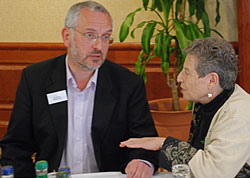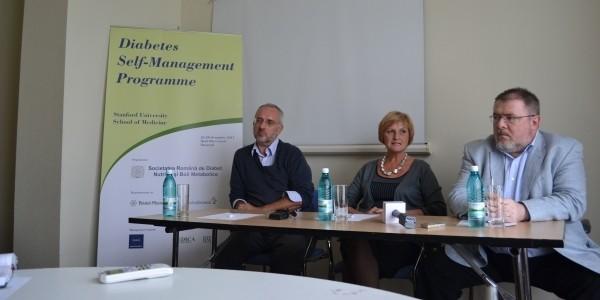|
Self Management of Long Term
Medical Conditions
 As well as music Ian has also been working in the field of long term
condition management for nearly 10 years, initially with the charity
Arthritis Care, but now as an independent trainer. Self management of
long term conditions was brought together as a written course over 20
years ago by Prof Kate Lorig at Stanford University in California (Ian
and Prof Lorig are pictured left). The programme has grown and expanded
and is now given in nearly 30 countries worldwide and in a variety of
languages.
As well as music Ian has also been working in the field of long term
condition management for nearly 10 years, initially with the charity
Arthritis Care, but now as an independent trainer. Self management of
long term conditions was brought together as a written course over 20
years ago by Prof Kate Lorig at Stanford University in California (Ian
and Prof Lorig are pictured left). The programme has grown and expanded
and is now given in nearly 30 countries worldwide and in a variety of
languages.
Ian was trained as a Master Trainer in both the Arthritis Self Management
Programme (ASMP) and the Chronic Disease Self Management Programme (CDSMP)
he furthered his involvement by being trained as a T Trainer at Stanford
in 2007, returning the following year to train on the new Type 2 Diabetes
programme. He is now trained on the Positive Self Management Programme
(PSMP) for living with HIV/AIDS as well.
 In
the last 5 years he has run over 30 leader trainings and helped set
up programmes in Ireland, Lithuania and Slovenia. In the autumn of 2011
Ian together with Jean Thompson ran the first Stanford Type 2 Diabetes
Training in Romania to 24 health professionals. He is the current chair
of the UK T Trainer group and works closely with EPP CIC and other organisations
delivering self management training. External trainings have included
running two Master Trainer Trainings mostly for staff from English PCT’s
and he has also run Assessor, Delivery Skills and Update Training as
well as working as an independent facilitator. He has been involved
with SS2Q for a number of years and also has experience in the video
conference delivery of courses to remote communities. In
the last 5 years he has run over 30 leader trainings and helped set
up programmes in Ireland, Lithuania and Slovenia. In the autumn of 2011
Ian together with Jean Thompson ran the first Stanford Type 2 Diabetes
Training in Romania to 24 health professionals. He is the current chair
of the UK T Trainer group and works closely with EPP CIC and other organisations
delivering self management training. External trainings have included
running two Master Trainer Trainings mostly for staff from English PCT’s
and he has also run Assessor, Delivery Skills and Update Training as
well as working as an independent facilitator. He has been involved
with SS2Q for a number of years and also has experience in the video
conference delivery of courses to remote communities.
Ian is a Consultant Member of the Talking Health Network, a confederation
of trainers in the self management field who can design, deliver or
support self management training throughout the UK and Europe. Talking
Health Network Website
Effective therapies against diabetes depends on
the patient's ability to manage disease, trainers say Stanford University
School of Medicine
Author: Raluca Bajenaru Posted on October
26, 2011

'Ian with fellow trainer Jean Thompson and Dr Cristian Serafinceanu head
of Diabetes Services for Bucharest at a press conference to launch the
Stanford Type 2 Diabetes Self management course in Romania'.
Half of the effectiveness of therapies against diabetes is the patient's
ability to manage the disease, said Dr. Cristian Serafinceanu from the
National Institute of Nutrition and Metabolic Diseases "Prof. Dr.
N. Paulescu" during a press conference with running in Romania
at Stanford University School of Medicine - Diabetes Self-Management
Programme . Initiated by the Romanian Society of Diabetes,
Nutrition and Metabolic Diseases, Bristol Myers Squibb together with
companies and AstraZeneca, the program five days to prepare plans for
medical staff, in turn, doctors and nurses to provide patients with
information which could help them better manage their disease and enjoy
a better quality of life. "Education of the diabetic patient
is more important than any other condition and should raise awareness
of authorities on the importance and difficulties in this area. What
we do is, in fact, risk management and it is hard to convince people
about the danger which lurks, but do not feel it. The prevention
is not cheaper or easier, but it is much better, since every complication
of diabetes avoided won eight patient years of life, a better quality
of living, "said Professor Dr . Serafinceanu who referred to the
spread of diabetes in the world as an "explosion pandemic",
noting that only the Bucharest are diagnosed each year 3,000 people
with diabetes. "For the success of such a program requires
support from the authorities, the medical system, but also from health
professionals and patients. The more difficult changes are the
authorities and the medical system and the most effective changes are
small but the impact, "said Jean Thompson (England), one of the
trainers from the Stanford University who gave courses in the program
. Thompson said that the UK has so far invested millions of pounds
to educate patients with chronic diseases and that the moment they started
to prepare physicians to help patients become as independent in managing
the disease. "When you are diagnosed with diabetes already
are labelled in some way, and the first step is accepting the disease
and the changes you need to do in life - you continue to eat, for example,
but otherwise, you have to restart you move, to go shopping differently
- reading labels more carefully. We tried to make the doctors to
put patients and instead try to think like them because, in addition
to medical standpoint, there is a need for emotional management of the
disease and the patient's social role " said Ian Darling (Scotland),
trainer for Stanford University, adding that according to studies, better
communication with the physician and the patient better education about
the disease have reduced visits to family doctors or psychologists,
and need for prescribing certain drugs, thus saving resources for health
systems.
|




 As well as music Ian has also been working in the field of long term
condition management for nearly 10 years, initially with the charity
Arthritis Care, but now as an independent trainer. Self management of
long term conditions was brought together as a written course over 20
years ago by Prof Kate Lorig at Stanford University in California (Ian
and Prof Lorig are pictured left). The programme has grown and expanded
and is now given in nearly 30 countries worldwide and in a variety of
languages.
As well as music Ian has also been working in the field of long term
condition management for nearly 10 years, initially with the charity
Arthritis Care, but now as an independent trainer. Self management of
long term conditions was brought together as a written course over 20
years ago by Prof Kate Lorig at Stanford University in California (Ian
and Prof Lorig are pictured left). The programme has grown and expanded
and is now given in nearly 30 countries worldwide and in a variety of
languages.
 In
the last 5 years he has run over 30 leader trainings and helped set
up programmes in Ireland, Lithuania and Slovenia. In the autumn of 2011
Ian together with Jean Thompson ran the first Stanford Type 2 Diabetes
Training in Romania to 24 health professionals. He is the current chair
of the UK T Trainer group and works closely with EPP CIC and other organisations
delivering self management training. External trainings have included
running two Master Trainer Trainings mostly for staff from English PCT’s
and he has also run Assessor, Delivery Skills and Update Training as
well as working as an independent facilitator. He has been involved
with SS2Q for a number of years and also has experience in the video
conference delivery of courses to remote communities.
In
the last 5 years he has run over 30 leader trainings and helped set
up programmes in Ireland, Lithuania and Slovenia. In the autumn of 2011
Ian together with Jean Thompson ran the first Stanford Type 2 Diabetes
Training in Romania to 24 health professionals. He is the current chair
of the UK T Trainer group and works closely with EPP CIC and other organisations
delivering self management training. External trainings have included
running two Master Trainer Trainings mostly for staff from English PCT’s
and he has also run Assessor, Delivery Skills and Update Training as
well as working as an independent facilitator. He has been involved
with SS2Q for a number of years and also has experience in the video
conference delivery of courses to remote communities.